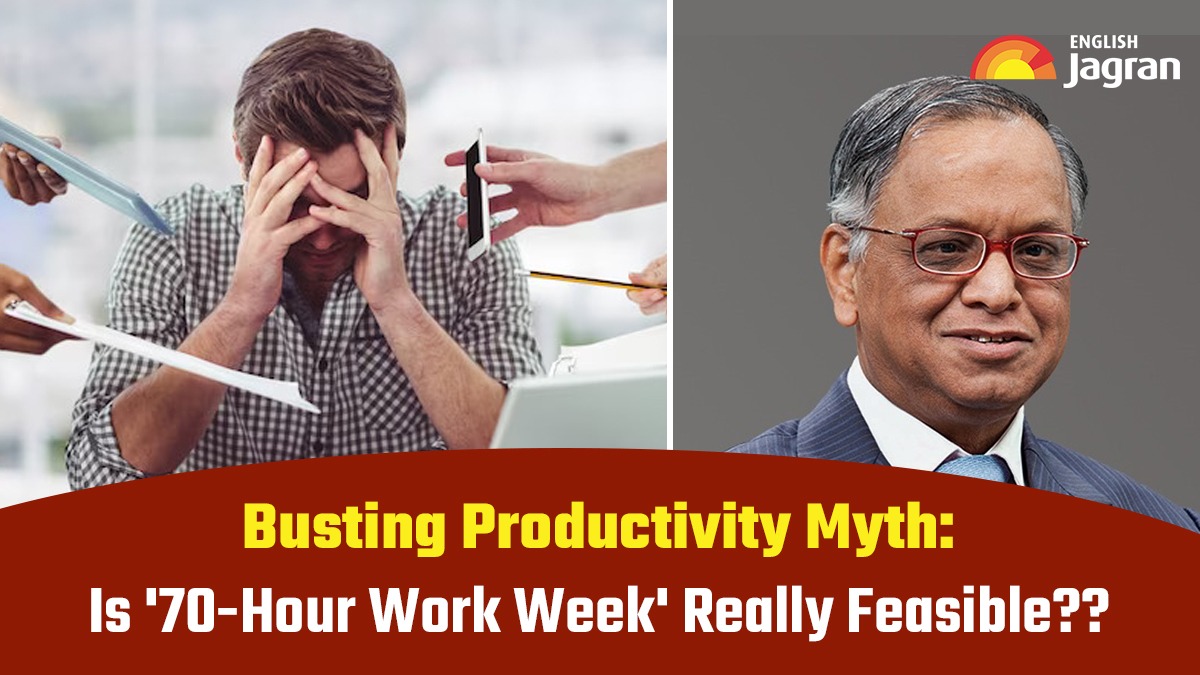- By Kamal Kumar
- Sat, 28 Oct 2023 02:44 PM (IST)
- Source:JND
70-Hour Work Week: Infosys founder and IT stalwart, NR Narayana Murthy recently sparked a new debate around a perennial hot topic of weekly working hours by the employees. While speaking to Infosys CEO Mohandas Pai in a podcast named 'The Record', Narayan Murthy said that India's work culture needs to change and to make the country competitive on the world stage, our youngsters should be prepared to work 70 hours a week.
Allegorising India to post-Second World War Germany and Japan, 70-year-old Narayan Murthy went on to highlight the importance of enhanced productivity as a product of long working hours and discipline.
"India's work productivity is one of the lowest in the world. Unless we improve our work productivity, unless we reduce corruption in the government at some level, because we have been reading, I don't know the truth of it unless we reduce the delays in our bureaucracy in taking this decision, we will not be able to compete with those countries that have made tremendous progress," the Infosys founder said, adding, "So, therefore, my request is that our youngsters must say This is my country. I'd like to work 70 hours a week," he added.
Ensued Debate-
Following his remarks, reactions from all corners of the country started pouring in. Many called his idea 'the endless capitalistic greed while others took a jibe at entry-level salaries in the Indian IT sector which is as low as '3 lakh per annum'. Nevertheless, his statements were successful in sparking a fresh debate on the current work culture of the country -including working hours, workplace environment and employee management.
Also Read: How Kargil War Changed India's Stance On Israel-Palestine Conflict | Explained
The current average weekly working hours in India can be up to 48 hours as per a report from the International Labour Organisation. In contrast, an average worker in the US works 37 hours a week, 36 hours in the US, and 46 hours in China. Despite the long working hours, the minimum wages provided to Indian workers in exchange for their service are the lowest in the world, rendering the debate heavily biased. India's minimum wage are lowest among the big and middle-income economies.
Here is a table of weekly average working hours by the workers in some notable big, middle-income and economic blocs-
| India | 48 (statutory limit) |
| France | 35 |
| United States | 40 (effective 37) |
| Brazil | 44 |
| Russia | 40 |
| United Kingdom | 36 (Maximum 48) |
| China | 46 |
| Chile | 45 (Cutting to 40) |
| OECD Average | 40 |
Do long working hours result in enhanced productivity?
Many studies have been conducted globally to assess the impact of long working hours on the productivity, mental health, physical health, and job satisfaction of employees. In one of the studies, exploring the relationship between work/life balance and performance, Biedman and Medina (2014) of the University of Cadiz found that, for workers, one of the factors significantly influencing their overall happiness is the time they spend with their family. Essentially, maintaining a positive equilibrium between their work and family commitments seems to be a crucial element in both employee satisfaction and efficiency within the company.
A similar meta-analysis was undertaken by Kapo Wong, Alan H. S. Chan, and S. C. Ngan of the University of Hong Kong in which the researchers found that long working hours affected the health of workers. The study highlighted several health hazards that arise from long working hours which include risks of cardiovascular diseases, posture diseases, chronic fatigue, stress, depressive state, anxiety, sleep quality, and other mental health issues.
Several other studies have suggested almost similar results, thus it is imperative to say that long working hours don't necessarily translate to enhanced productivity.
Way forward:
Our country is standing at a critical juncture in modern-day history, looking to achieve big economic aspirations and to lead ourselves to a developed nation. However, it remains crucial that we take care of the requirements of the working class, especially the coming generations. Industry leaders and employers should try and strike a balance between the work and life of their employees. This is a time when high productivity should stem from investments in better skills, technology, policy efficiencies, and work culture rather than only additional hours.
Also Read: Iron Beam: The Deadly Laser Weapon That Israel Might Unleash Against Hamas, Hezbollah | Explained

